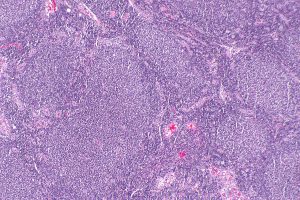FDA Approves New Molecularly Targeted Therapeutic for Non-Hodgkin Lymphoma
The flurry of treatments approved by the U.S. Food and Drug Administration (FDA) for treating hematological malignancies continued last week with the approval of the molecularly targeted therapeutic copanlisib (Aliqopa) for the treatment of certain adults with non-Hodgkin lymphoma.
The approval of copanlisib for treating adults with follicular lymphoma that has returned after two or more systemic treatments makes it the sixth treatment approved for patients with hematological malignancies since the start of August. The other five were enasidenib (Idhifa), Vyxeos, inotuzumab ozogamicin (Besponsa), tisagenlecleucel (Kymriah), and gemtuzumab ozogamicin (Mylotarg).
Different types of non-Hodgkin lymphoma grow and spread at different rates. Those that grow and spread slowly are referred to as indolent lymphomas. Follicular lymphoma is the most common type of indolent non-Hodgkin lymphoma diagnosed in the United States. It arises in cells of the immune system called B cells.
“For patients with relapsed follicular lymphoma, the cancer often comes back even after multiple treatments,” said Richard Pazdur, MD, director of the FDA’s Oncology Center of Excellence and acting director of the Office of Hematology and Oncology Products in the FDA’s Center for Drug Evaluation and Research in a press release. He went on to explain that options are limited for these patients and that the new approval fills an unmet need for them.
Copanlisib targets two forms of a molecule called phosphatidylinositol 3-kinase (PI3K), PI3K-alpha and PI3K-delta. PI3K is a component of a signaling pathway that has a key role in promoting the survival and expansion of many types of cells, including the B cells affected in follicular lymphoma. PI3K is, therefore, a prime therapeutic target.
The approval of copanlisib for treating follicular lymphoma was based on results from a phase II clinical trial that were first presented at the AACR Annual Meeting 2017. Specifically, the results of CHRONOS-1 showed that 14.4 percent of patients with follicular lymphoma who received copanlisib had complete tumor shrinkage and 44.2 percent had partial tumor shrinkage. These data gave an overall response rate of 58.7 percent.
Given that the approval is based on overall response rate rather than overall survival data, the FDA requires Bayer, the manufacturer of copanlisib, to conduct additional clinical trials to confirm that the molecularly targeted therapeutic improves survival. Such studies, as well as trials testing copanlisib as a potential treatment for other types of non-Hodgkin lymphoma, are underway. We look forward to learning the results of these as they become available.




